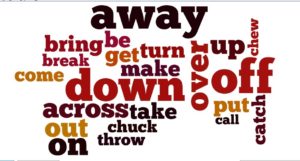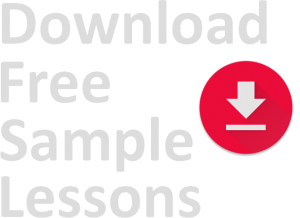How to learn phrasal verbs easily
Native English speakers use phrasal verbs all the time. So, if you want to learn English, you’re going to have to learn them too. But what’s the best way to learn phrasal verbs?

As you probably know, a phrasal verb is formed by a verb and a particle. This particle is usually a short word or preposition: up, with, to, out, in…
However, the meaning of the phrasal verb is often different to the meaning of each individual word within the phrasal verb. And this is what makes some of them so difficult. For example, you may understand the verb to make and the preposition up, but the phrasal verb to make up often means to invent.

So, what can you do to learn phrasal verbs? Here are SIX tricks to help you. [Please see the table at the end of this article for the meaning of any phrasal verbs in bold.]
1.The particle!
You can understand many phrasal verbs from the particle alone. For example, what do you think the phrasal verbs in bold mean?
a) House prices are going up.
b) She got over the cold after a few days’ rest.
Once you know the basic meaning of these particles, they can really help you understand the phrasal verbs. In this case, up means to go to a higher level, so to go up means to increase in this case; and over means to go from one state, level or stage to another, so to get over an illness means to recover from it in this case.

2. The verb!
In many cases, the particle doesn’t contribute much – it only changes the meaning in a very small way. So, sometimes it’s the verb that can help. For example, what do you think these phrasal verbs in bold mean?
a) My car broke down as I was driving along the motorway.
b) They were running about in the garden.
You could probably guess the meaning of these phrasal verbs just from the verbs. The particles are just extras!
3.Context!
Another thing to look at is the context. What are the people talking about? What’s the topic of conversation? Once you know this, you’ll find it easier to work out the meaning of the phrasal verb. For example, what do you think the phrasal verb to put up means in this sentence?
“You are rude and disrespectful and you’ve got a really bad attitude. Either you change or you’re out! I refuse to put up with it any longer!”
4. Guess!
Once you know the context, the best thing is to guess the meaning of any phrasal verbs. This is what native speakers do. In fact, if you asked a native English speaker for a definition of many phrasal verbs, they might not be able to help; however, if they saw or heard the phrasal verb in a conversation, they’d understand its meaning easily.

5. Read & listen!
You can learn many phrasal verbs passively by reading and listening to English. No one really sits down to learn phrasal verbs in their own language – they pick them up over time after hearing them or reading them in context. And this is what you should do. Above all, don’t try to learn lists of phrasal verbs with their definitions. Always learn them in context: in sentences, in paragraphs or in complete texts! Another good way to learn them is by grouping them into topic areas: phrasal verbs for the phone, meetings, travel…
6.No rules!
There are lots of complicated rules about the use of phrasal verbs. Is the particle a preposition or an adverb? Is the phrasal verb separable or inseparable? However, the best way to learn how to use a phrasl verb is by seeing or hearing it several times. Then, you can copy the way they’re used when you’re speaking or writing. For example, if you see or hear the phrase “I made it up” several times, you’ll start using it yourself soon. And remember, when you’re speaking or writing English, you don’t necessarily need to use phrasal verbs as there’s usually an alternative way of expressing the idea. For example:
“You made up that story, didn’t you?” = “You invented that story, didn’t you?”
Have fun learning phrasal verbs!
Phrasal Verb Guide:
- Make up = to invent.
- Go up = to increase.
- Get over = If you “get over” an illness, you become better and the illness goes away.
- Break down = If your car “breaks down”, it stops working.
- Run about = If you’re “running about”, you’re running here and there with no particular objective.
- Work out = to discover the meaning of something.
- Put up with = If you “put up with” a bad situation, you accept it and you don’t do anything about it.
- Pick up = to learn something, often without making a conscious effort.
More Phrasal verbs here



